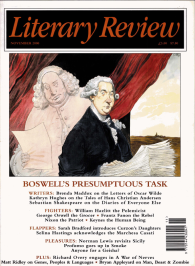Stanley Stewart
Where Family Values Are Not Encouraged
In Sicily
By Norman Lewis
Jonathan Cape 170pp £14.99
There are two views of Sicily. One is that it is a place apart, a bastard land of spectacularly mixed parentage. In Sicilian veins there is said to be less Italian blood than Greek, Arab, Levantine, Norman or Spanish. They do things differently in Sicily, and even the Calabrians, it is said, look upon the island as irredeemably alien.
The other view was expressed by Goethe when he suggested that it was impossible to have any idea of the true nature of Italy without visiting Sicily. According to this thesis, it contains every Italian virtue and defect in exaggerated form, a sort of island pastiche of the mainland. Norman Lewis is too wise to choose between these divergent views. Naturally, in this perverse place, both are true.
Lewis is an old Sicily hand. His life has been enmeshed with the island for over sixty years. On his early visits, he found a society just emerging from the Dark Ages. On this most recent foray, he encounters a place of superficial modernity, where all the old Sicilian counterweights of civilisation and barbarism, charm and horror, tragedy and farce are still in taut opposition.
The author's previous book about Sicily, The Honoured Society, published in the early Sixties, was primarily a study of the Mafia and its deep roots in the island's culture. If readers had hoped that this latest offering on Sicily might avoid the Family, they will be disappointed. To write about Sicily without reference to the Mafia would be like writing about Rome without mentioning the Vatican. Sixty years ago, a Sicilian told Walter Starkie that the Mafia and all its ramifications follow every Sicilian 'as closely as a shadow does the body'. In the first year of a new millennium this is as true as it ever was.
In Lewis's latest book Sicily emerges as a beautiful, accursed and irresistible place. In Palermo, poised between splendour and ruin, he finds humanity 'in its most concentrated form'. He describes a city that is both companionable and exuberant despite, or possibly because of, a murder rate twice that

Sign Up to our newsletter
Receive free articles, highlights from the archive, news, details of prizes, and much more.@Lit_Review
Follow Literary Review on Twitter
Twitter Feed
Alfred, Lord Tennyson is practically a byword for old-fashioned Victorian grandeur, rarely pictured without a cravat and a serious beard.
Seamus Perry tries to picture him as a younger man.
Seamus Perry - Before the Beard
Seamus Perry: Before the Beard - The Boundless Deep: Young Tennyson, Science, and the Crisis of Belief by Richard Holmes
literaryreview.co.uk
Novelist Muriel Spark had a tongue that could produce both sugar and poison. It’s no surprise, then, that her letters make for a brilliant read.
@claire_harman considers some of the most entertaining.
Claire Harman - Fighting Words
Claire Harman: Fighting Words - The Letters of Muriel Spark, Volume 1: 1944-1963 by Dan Gunn
literaryreview.co.uk
Of all the articles I’ve published in recent years, this is *by far* my favourite.
✍️ On childhood, memory, and the sea - for @Lit_Review :
https://literaryreview.co.uk/flotsam-and-jetsam